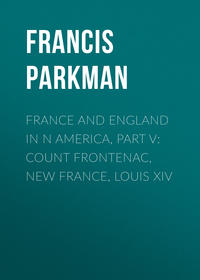 полная версия
полная версияFrance and England in North America, Part VI : Montcalm and Wolfe
No doubt there was justice in the suspicion. Every military movement, and above all the establishment of every new post, was an opportunity to the official thieves with whom the colony swarmed. Some band of favored knaves grew rich; while a much greater number, excluded from sharing the illicit profits, clamored against the undertaking, and wrote charges of corruption to Versailles. Thus the Minister was kept tolerably well informed; but was scarcely the less helpless, for with the Atlantic between, the disorders of Canada defied his control. Duquesne was exasperated by the opposition that met him on all hands, and wrote to the Minister: "There are so many rascals in this country that one is forever the butt of their attacks."67
It seems that unlawful gain was not the only secret spring of the movement. An officer of repute says that the Intendant, Bigot, enterprising in his pleasures as in his greed, was engaged in an intrigue with the wife of Chevalier Péan; and wishing at once to console the husband and to get rid of him, sought for him a high command at a distance from the colony. Therefore while Marin, an able officer, was made first in rank, Péan was made second. The same writer hints that Duquesne himself was influenced by similar motives in his appointment of leaders.68
He mustered the colony troops, and ordered out the Canadians. With the former he was but half satisfied; with the latter he was delighted; and he praises highly their obedience and alacrity. "I had not the least trouble in getting them to march. They came on the minute, bringing their own guns, though many people tried to excite them to revolt; for the whole colony opposes my operations." The expedition set out early in the spring of 1753. The whole force was not much above a thousand men, increased by subsequent detachments to fifteen hundred; but to the Indians it seemed a mighty host; and one of their orators declared that the lakes and rivers were covered with boats and soldiers from Montreal to Presquisle.69 Some Mohawk hunters by the St. Lawrence saw them as they passed, and hastened home to tell the news to Johnson, whom they wakened at midnight, "whooping and hollowing in a frightful manner."70 Lieutenant Holland at Oswego saw a fleet of canoes upon the lake, and was told by a roving Frenchman that they belonged to an army of six thousand men going to the Ohio, "to cause all the English to quit those parts."71
The main body of the expedition landed at Presquisle, on the southeastern shore of Lake Erie, where the town of Erie now stands; and here for a while we leave them.
CHAPTER IV.
1710-1754
CONFLICT FOR ACADIAAcadia ceded to England • Acadians swear Fidelity • Halifax founded • French Intrigue • Acadian Priests • Mildness of English Rule • Covert Hostility of Acadians • The New Oath • Treachery of Versailles • Indians incited to War • Clerical Agents of Revolt • Abbé Le Loutre • Acadians impelled to emigrate • Misery of the Emigrants • Humanity of Cornwallis and Hopson • Fanaticism and Violence of Le Loutre • Capture of the "St. François" • The English at Beaubassin • Le Loutre drives out the Inhabitants • Murder of Howe • Beauséjour • Insolence of Le Loutre • His Harshness to the Acadians • The Boundary Commission • Its Failure • Approaching War
While in the West all the signs of the sky foreboded storm, another tempest was gathering the East, less in extent, but not less in peril. The conflict in Acadia has a melancholy interest, since it ended in a catastrophe which prose and verse have joined to commemorate, but of which the causes have not been understood.
Acadia—that it to say, the peninsula of Nova Scotia, with the addition, as the English claimed, of the present New Brunswick and some adjacent country—was conquered by General Nicholson in 1710, and formally transferred by France to the British Crown, three years later, by the treaty of Utrecht. By that treaty it was "expressly provided" that such of the French inhabitants as "are willing to remain there and to be subject to the Kingdom of Great Britain, are to enjoy the free exercise of their religion according to the usage of the Church of Rome, as far as the laws of Great Britain do allow the same;" but that any who choose may remove, with their effects, if they do so within a year. Very few availed themselves of this right; and after the end of the year those who remained were required to take an oath of allegiance to King George. There is no doubt that in a little time they would have complied, had they been let alone; but the French authorities of Canada and Cape Breton did their utmost to prevent them, and employed agents to keep them hostile to England. Of these the most efficient were the French priests, who, in spite of the treaty, persuaded their flocks that they were still subjects of King Louis. Hence rose endless perplexity to the English commanders at Annapolis, who more than suspected that the Indian attacks with which they were harassed were due mainly to French instigation.72 It was not till seventeen years after the treaty that the Acadians could be brought to take the oath without qualifications which made it almost useless. The English authorities seem to have shown throughout an unusual patience and forbearance. At length, about 1730, nearly all the inhabitants signed by crosses, since few of them could write, an oath recognizing George II. as sovereign of Acadia, and promising fidelity and obedience to him.73 This restored comparative quiet till the war of 1745, when some of the Acadians remained neutral, while some took arms against the English, and many others aided the enemy with information and supplies.
English power in Acadia, hitherto limited to a feeble garrison at Annapolis and a feebler one at Canseau, received at this time a great accession. The fortress of Louisbourg, taken by the English during the war, had been restored by the treaty; and the French at once prepared to make it a military and naval station more formidable than ever. Upon this the British Ministry resolved to establish another station as a counterpoise; and the harbor of Chebucto, on the south coast of Acadia, was chosen as the site of it. Thither in June, 1749, came a fleet of transports loaded with emigrants, tempted by offers of land and a home in the New World. Some were mechanics, tradesmen, farmers, and laborers; others were sailors, soldiers, and subaltern officers thrown out of employment by the peace. Including women and children, they counted in all about twenty-five hundred. Alone of all the British colonies on the continent, this new settlement was the offspring, not of private enterprise, but of royal authority. Yet is was free like the rest, with the same popular representation and local self-government. Edward Cornwallis, uncle of Lord Cornwallis of the Revolutionary War, was made governor and commander-in-chief. Wolfe calls him "a man of approved courage and fidelity;" and even the caustic Horace Walpole speaks of him as "a brave, sensible young man, of great temper and good nature."
Before summer was over, the streets were laid out, and the building-lot of each settler was assigned to him; before winter closed, the whole were under shelter, the village was fenced with palisades and defended by redoubts of timber, and the battalions lately in garrison at Louisbourg manned the wooden ramparts. Succeeding years brought more emigrants, till in 1752 the population was above four thousand. Thus was born into the world the city of Halifax. Along with the crumbling old fort and miserably disciplined garrison at Annapolis, besides six or seven small detached posts to watch the Indians and Acadians, it comprised the whole British force on the peninsula; for Canseau had been destroyed by the French.
The French had never reconciled themselves to the loss of Acadia, and were resolved, by diplomacy or force, to win it back again; but the building of Halifax showed that this was to be no easy task, and filled them at the same time with alarm for the safety of Louisbourg. On one point, at least, they saw their policy clear. The Acadians, though those of them who were not above thirty-five had been born under the British flag, must be kept French at heart, and taught that they were still French subjects. In 1748 they numbered eighty-eight hundred and fifty communicants, or from twelve to thirteen thousand souls; but an emigration, of which the causes will soon appear, had reduced them in 1752 to but little more than nine thousand.74 These were divided into six principal parishes, one of the largest being that of Annapolis. Other centres of population were Grand Pré, on the basin of Mines; Beaubassin, at the head of Chignecto Bay; Pisiquid, now Windsor; and Cobequid, now Truro. Their priests, who were missionaries controlled by the diocese of Quebec, acted also as their magistrates, ruling them for this world and the next. Bring subject to a French superior, and being, moreover, wholly French at heart, they formed in this British province a wheel within a wheel, the inner movement always opposing the outer.
Although, by the twelfth article of the treaty of Utrecht, France had solemnly declared the Acadians to be British subjects, the Government of Louis XV. intrigued continually to turn them from subjects into enemies. Before me is a mass of English documents on Acadian affairs from the peace of Aix-la-Chapelle to the catastrophe of 1755, and above a thousand pages of French official papers from the archives of Paris, memorials, reports, and secret correspondence, relating to the same matters. With the help of these and some collateral lights, it is not difficult to make a correct diagnosis of the political disease that ravaged this miserable country. Of a multitude of proofs, only a few can be given here; but these will suffice.
It was not that the Acadians had been ill-used by the English; the reverse was the case. They had been left in free exercise of their worship, as stipulated by treaty. It is true that, from time to time, there were loud complaints from French officials that religion was in danger, because certain priests had been rebuked, arrested, brought before the Council at Halifax, suspended from their functions, or required, on pain of banishment, to swear that they would do nothing against the interests of King George. Yet such action on the part of the provincial authorities seems, without a single exception, to have been the consequence of misconduct on the part of the priest, in opposing the Government and stirring his flock to disaffection. La Jonquière, the determined adversary of the English, reported to the bishop that they did not oppose the ecclesiastics in the exercise of their functions, and an order of Louis XV. admits that the Acadians have enjoyed liberty of religion.75 In a long document addressed in 1750 to the Colonial Minister at Versailles, Roma, an officer at Louisbourg, testifies thus to the mildness of British rule, though he ascribes it to interested motives. "The fear that the Acadians have of the Indians is the controlling motive which makes them side with the French. The English, having in view the conquest of Canada, wished to give the French of that colony, in their conduct towards the Acadians, a striking example of the mildness of their government. Without raising the fortune of any of the inhabitants, they have supplied them for more than thirty-five years with the necessaries of life, often on credit and with an excess of confidence, without troubling their debtors, without pressing them, without wishing to force them to pay. They have left them an appearance of liberty so excessive that they have not intervened in their disputes or even punished their crimes. They have allowed them to refuse with insolence certain moderate rents payable in grain and lawfully due. They have passed over in silence the contemptuous refusal of the Acadians to take titles from them for the new lands which they chose to occupy.76
"We know very well," pursues Roma, "the fruits of this conduct in the last war; and the English know it also. Judge then what will be the wrath and vengeance of this cruel nation." The fruits to which Roma alludes were the hostilities, open or secret, committed by the Acadians against the English. He now ventures the prediction that the enraged conquerors will take their revenge by drafting all the young Acadians on board their ships of war, and there destroying them by slow starvation. He proved, however, a false prophet. The English Governor merely required the inhabitants to renew their oath of allegiance, without qualification or evasion.
It was twenty years since the Acadians had taken such an oath; and meanwhile a new generation had grown up. The old oath pledged them to fidelity and obedience; but they averred that Phillips, then governor of the province, had given them, at the same time, assurance that they should not be required to bear arms against either French or Indians. In fact, such service had not been demanded of them, and they would have lived in virtual neutrality, had not many of them broken their oaths and joined the French war-parties. For this reason Cornwallis thought it necessary that, in renewing the pledge, they should bind themselves to an allegiance as complete as that required of other British subjects. This spread general consternation. Deputies from the Acadian settlements appeared at Halifax, bringing a paper signed with the marks of a thousand persons. The following passage contains the pith of it. "The inhabitants in general, sir, over the whole extent of this country are resolved not to take the oath which your Excellency requires of us; but if your Excellency will grant us our old oath, with an exemption for ourselves and our heirs from taking up arms, we will accept it."77 The answer of Cornwallis was by no means so stern as it has been represented.78 After the formal reception he talked in private with the deputies; and "they went home in good humor, promising great things."79
The refusal of the Acadians to take the required oath was not wholly spontaneous, but was mainly due to influence from without. The French officials of Cape Breton and Isle St. Jean, now Prince Edward Island, exerted themselves to the utmost, chiefly through the agency of the priests, to excite the people to refuse any oath that should commit them fully to British allegiance. At the same time means were used to induce them to migrate to the neighboring islands under French rule, and efforts were also made to set on the Indians to attack the English. But the plans of the French will best appear in a despatch sent by La Jonquière to the Colonial Minister in the autumn of 1749.
"Monsieur Cornwallis issued an order on the tenth of the said month [August], to the effect that if the inhabitants will remain faithful subjects of the King of Great Britain, he will allow them priests and public exercise of their religion, with the understanding that no priest shall officiate without his permission or before taking an oath of fidelity to the King of Great Britain. Secondly, that the inhabitants shall not be exempted from defending their houses, their lands, and the Government. Thirdly, that they shall take an oath of fidelity to the King of Great Britain, on the twenty-sixth of this month, before officers sent them for that purpose."
La Jonquière proceeds to say that on hearing these conditions the Acadians were filled with perplexity and alarm, and that he, the governor, had directed Boishébert, his chief officer on the Acadian frontier, to encourage them to leave their homes and seek asylum on French soil. He thus recounts the steps he has taken to harass the English of Halifax by means of their Indian neighbors. As peace had been declared, the operation was delicate; and when three of these Indians came to him from their missionary, Le Loutre, with letters on the subject, La Jonquière was discreetly reticent. "I did not care to give them any advice upon the matter, and confined myself to a promise that I would on no account abandon them; and I have provided for supplying them with everything, whether arms, ammunition, food, or other necessaries. It is to be desired that these savages should succeed in thwarting the designs of the English, and even their settlement at Halifax. They are bent on doing so; and if they can carry out their plans, it is certain that they will give the English great trouble, and so harass them that they will be a great obstacle in their path. These savages are to act alone; neither soldier nor French inhabitant is to join them; everything will be done of their own motion, and without showing that I had any knowledge of the matter. This is very essential; therefore I have written to the Sieur de Boishébert to observe great prudence in his measures, and to act very secretly, in order that the English may not perceive that we are providing for the needs of the said savages.
"It will be the missionaries who will manage all the negotiation, and direct the movements of the savages, who are in excellent hands, as the Reverend Father Germain and Monsieur l'Abbé Le Loutre are very capable of making the most of them, and using them to the greatest advantage for our interests. They will manage their intrigue in such a way as not to appear in it."
La Jonquière then recounts the good results which he expects from these measures: first, the English will be prevented from making any new settlements; secondly, we shall gradually get the Acadians out of their hands; and lastly, they will be so discouraged by constant Indian attacks that they will renounce their pretensions to the parts of the country belonging to the King of France. "I feel, Monseigneur,"—thus the Governor concludes his despatch,—"all the delicacy of this negotiation; be assured that I will conduct it with such precaution that the English will not be able to say that my orders had any part in it."80
He kept his word, and so did the missionaries. The Indians gave great trouble on the outskirts of Halifax, and murdered many harmless settlers; yet the English authorities did not at first suspect that they were hounded on by their priests, under the direction of the Governor of Canada, and with the privity of the Minister at Versailles. More than this; for, looking across the sea, we find royalty itself lending its august countenance to the machination. Among the letters read before the King in his cabinet in May, 1750, was one from Desherbiers, then commanding at Louisbourg, saying that he was advising the Acadians not to take the oath of allegiance to the King of England; another from Le Loutre, declaring that he and Father Germain were consulting together how to disgust the English with their enterprise of Halifax; and a third from the Intendant, Bigot, announcing that Le Loutre was using the Indians to harass the new settlement, and that he himself was sending them powder, lead, and merchandise, "to confirm them in their good designs."81
To this the Minister replies in a letter to Desherbiers: "His Majesty is well satisfied with all you have done to thwart the English in their new establishment. If the dispositions of the savages are such as they seem, there is reason to hope that in the course of the winter they will succeed in so harassing the settlers that some of them will become disheartened." Desherbiers is then told that His Majesty desires him to aid English deserters in escaping from Halifax.82 Supplies for the Indians are also promised; and he is informed that twelve medals are sent him by the frigate "La Mutine," to be given to the chiefs who shall most distinguish themselves. In another letter Desherbiers is enjoined to treat the English authorities with great politeness.83
When Count Raymond took command at Louisbourg, he was instructed, under the royal hand, to give particular attention to the affairs of Acadia, especially in two points,—the management of the Indians, and the encouraging of Acadian emigration to countries under French rule. "His Majesty," says the document, "has already remarked that the savages have been most favorably disposed. It is of the utmost importance that no means be neglected to keep them so. The missionaries among them are in a better position than anybody to contribute to this end, and His Majesty has reason to be satisfied with the pains they take therein. The Sieur de Raymond will excite these missionaries not to slacken their efforts; but he will warn them at the same time so to contain their zeal as not to compromise themselves with the English, and give just occasion of complaint."84 That is, the King orders his representative to encourage the missionaries in instigating their flocks to butcher English settlers, but to see that they take care not to be found out. The injunction was hardly needed. "Monsieur Desherbiers," says a letter of earlier date, "has engaged Abbé Le Loutre to distribute the usual presents among the savages, and Monsieur Bigot has placed in his hands an additional gift of cloth, blankets, powder, and ball, to be given them in case they harass the English at Halifax. This missionary is to induce them to do so."85 In spite of these efforts, the Indians began to relent in their hostilities; and when Longueuil became provisional governor of Canada, he complained to the Minister that it was very difficult to prevent them from making peace with the English, though Father Germain was doing his best to keep them on the war-path.86 La Jonquière, too, had done his best, even to the point of departing from his original policy of allowing no soldier or Acadian to take part with them. He had sent a body of troops under La Corne, an able partisan officer, to watch the English frontier; and in the same vessel was sent a supply of "merchandise, guns, and munitions for the savages and the Acadians who may take up arms with them; and the whole is sent under pretext of trading in furs with the savages."87 On another occasion La Jonquière wrote: "In order that the savages may do their part courageously, a few Acadians, dressed and painted in their way, could join them to strike the English. I cannot help consenting to what these savages do, because we have our hands tied [by the peace], and so can do nothing ourselves. Besides, I do not think that any inconvenience will come of letting the Acadians mingle among them, because if they [the Acadians] are captured, we shall say that they acted of their own accord."88 In other words, he will encourage them to break the peace; and then, by means of a falsehood, have them punished as felons. Many disguised Acadians did in fact join the Indian war-parties; and their doing so was no secret to the English. "What we call here an Indian war," wrote Hopson, successor of Cornwallis, "is no other than a pretence for the French to commit hostilities on His Majesty's subjects."
At length the Indians made peace, or pretended to do so. The chief of Le Loutre's mission, who called himself Major Jean-Baptiste Cope, came to Halifax with a deputation of his tribe, and they all affixed their totems to a solemn treaty. In the next summer they returned with ninety or a hundred warriors, were well entertained, presented with gifts, and sent homeward in a schooner. On the way they seized the vessel and murdered the crew. This is told by Prévost, intendant at Louisbourg, who does not say that French instigation had any part in the treachery.89 It is nevertheless certain that the Indians were paid for this or some contemporary murder; for Prévost, writing just four weeks later, says: "Last month the savages took eighteen English scalps, and Monsieur Le Loutre was obliged to pay them eighteen hundred livres, Acadian money, which I have reimbursed him."90
From the first, the services of this zealous missionary had been beyond price. Prévost testifies that, though Cornwallis does his best to induce the Acadians to swear fidelity to King George, Le Loutre keeps them in allegiance to King Louis, and threatens to set his Indians upon them unless they declare against the English. "I have already," adds Prévost, "paid him 11,183 livres for his daily expenses; and I never cease advising him to be as economical as possible, and always to take care not to compromise himself with the English Government."91 In consequence of "good service to religion and the state," Le Loutre received a pension of eight hundred livres, as did also Maillard, his brother missionary on Cape Breton. "The fear is," writes the Colonial Minister to the Governor of Louisbourg, "that their zeal may carry them too far. Excite them to keep the Indians in our interests, but do not let them compromise us. Act always so as to make the English appear as aggressors."92







